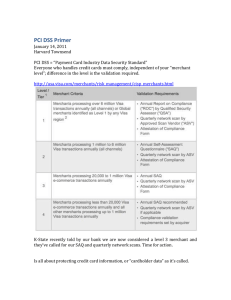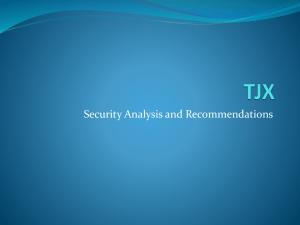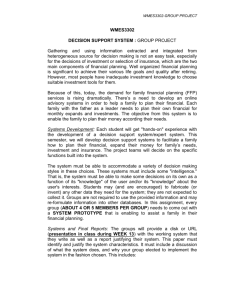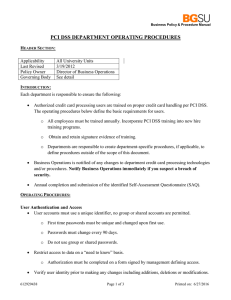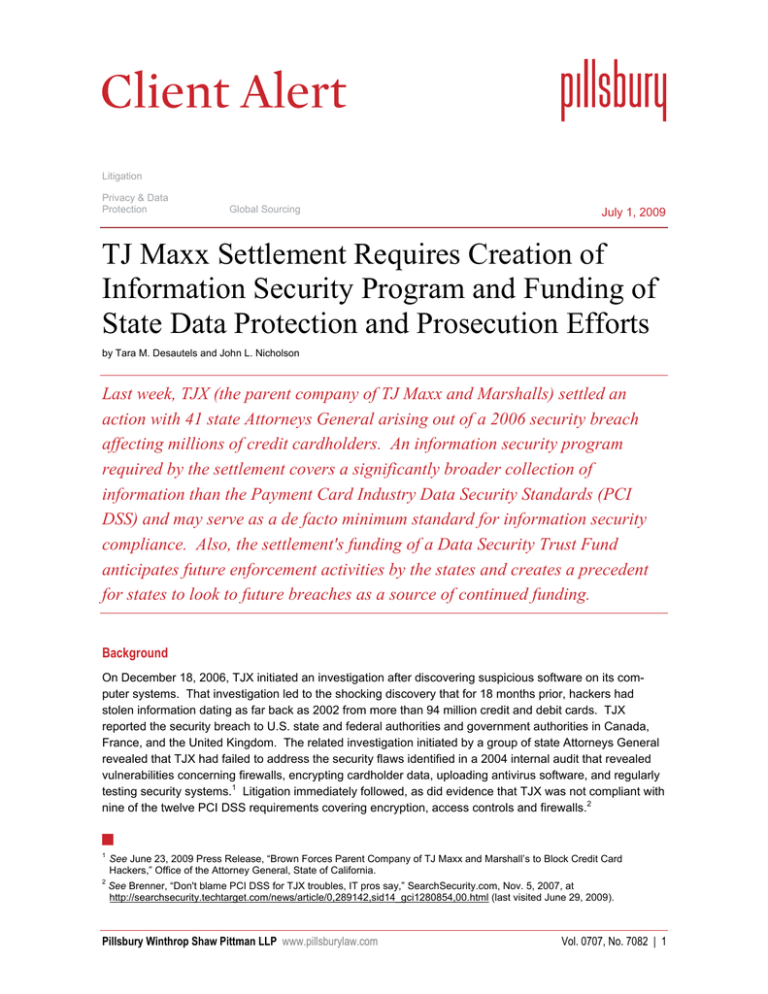
Client Alert
Privacy & Data Protection
Litigation
Privacy & Data
Protection
Global Sourcing
July 1, 2009
TJ Maxx Settlement Requires Creation of
Information Security Program and Funding of
State Data Protection and Prosecution Efforts
by Tara M. Desautels and John L. Nicholson
Last week, TJX (the parent company of TJ Maxx and Marshalls) settled an
action with 41 state Attorneys General arising out of a 2006 security breach
affecting millions of credit cardholders. An information security program
required by the settlement covers a significantly broader collection of
information than the Payment Card Industry Data Security Standards (PCI
DSS) and may serve as a de facto minimum standard for information security
compliance. Also, the settlement's funding of a Data Security Trust Fund
anticipates future enforcement activities by the states and creates a precedent
for states to look to future breaches as a source of continued funding.
Background
On December 18, 2006, TJX initiated an investigation after discovering suspicious software on its computer systems. That investigation led to the shocking discovery that for 18 months prior, hackers had
stolen information dating as far back as 2002 from more than 94 million credit and debit cards. TJX
reported the security breach to U.S. state and federal authorities and government authorities in Canada,
France, and the United Kingdom. The related investigation initiated by a group of state Attorneys General
revealed that TJX had failed to address the security flaws identified in a 2004 internal audit that revealed
vulnerabilities concerning firewalls, encrypting cardholder data, uploading antivirus software, and regularly
testing security systems.1 Litigation immediately followed, as did evidence that TJX was not compliant with
nine of the twelve PCI DSS requirements covering encryption, access controls and firewalls.2
J
1
See June 23, 2009 Press Release, “Brown Forces Parent Company of TJ Maxx and Marshall’s to Block Credit Card
Hackers,” Office of the Attorney General, State of California.
2
See Brenner, “Don't blame PCI DSS for TJX troubles, IT pros say,” SearchSecurity.com, Nov. 5, 2007, at
http://searchsecurity.techtarget.com/news/article/0,289142,sid14_gci1280854,00.html (last visited June 29, 2009).
Pillsbury Winthrop Shaw Pittman LLP www.pillsburylaw.com
Vol. 0707, No. 7082 | 1
Client Alert
Privacy & Data Protection
On June 23, 2009, TJX settled the action with 41 state Attorneys General for $9.75 million.3 This settlement agreement follows the 2007 settlements of the consolidated consumer class action4 and an action
initiated by Visa, Inc.5 But unlike the prior settlement agreements, in addition to monetary payments, the
June 23 agreement requires TJX to implement a comprehensive “Information Security Program” and fund
future state data protection efforts as part of “the most comprehensive relief achieved to date following a
data breach investigation.”6
The Terms
The settlement agreement between TJX and the states (known as the “Assurance”) breaks down the $9.75
million payments into cost reimbursement and future data protection funding:7
$5.5 million will be dedicated to data protection and consumer protection efforts by the states;
$1.75 million will reimburse the states for their costs and fees incurred in the investigation; and
$2.5 million will fund a “Data Security Trust Fund” to be used by the state Attorneys General to
“advance enforcement efforts and policy development in the field of data security and protecting
consumers’ personal information.”
Within the next 120 days, TJX must also “implement and maintain a comprehensive Information Security
Program that is reasonably designed to protect the security, confidentiality, and integrity of Personal Information.” The Assurance uses a definition of Personal Information that is generally consistent with numerous state data breach notification laws and is significantly broader than the definition of “cardholder data”
used by the PCI DSS. According to the Assurance,
“Personal Information” shall mean any TJX record, whether in paper, electronic or other form,
containing nonpublic personal information about a Consumer collected in connection with a
Transaction, including, but not limited to, any (1) Consumer’s name, address, or telephone
number, in conjunction with the Consumer’s Social Security number, driver’s license number,
financial account number, or credit or debit card number; (2) Consumer’s user name and
passphrase used to authorize Transactions over the Internet; or (3) sensitive payment card
authentication data, which shall mean (a) Primary Account Number (‘PAN’); (b) cardholder name,
J
3
The participating states are: Alabama, Arizona, Arkansas, California, Colorado, Connecticut, Delaware, Florida, Hawaii,
Idaho, Illinois, Iowa, Louisiana, Maine, Maryland, Massachusetts, Michigan, Mississippi, Missouri, Montana, Nebraska,
Nevada, New Hampshire, New Jersey, New Mexico, New York, North Carolina, North Dakota, Ohio, Oklahoma, Oregon,
Pennsylvania, Rhode Island, South Dakota, Tennessee, Texas, Vermont, Washington, West Virginia, Wisconsin, and the
District of Columbia.
4
On November 14, 2007, parties reached a proposed settlement agreement in the Consolidated Consumer Class Action
approved by the United States District Court for the District of Massachusetts on September 2, 2008. The settlement
agreement provided for compensation to injured consumers through vouchers or checks-in-lieu, credit monitoring, identity
theft insurance, reimbursements, a one-time sale event, and over $6.5 million in attorneys fees and costs. In re TJX
Companies Retail Security Breach Litigation, United States District Court, District of Massachusetts, Civil Action No. 0710162, MDL Docket No. 1838, Dkt. 368.
5
In the November 30, 2007 settlement agreement with Visa Inc., TJX agreed to provide U.S. credit card issuers up to $40.9
million in alternative recovery payments. In a December 20, 2007 press release, TJX announced over 95% of the affected
institutions accepted the proposal.
6
See June 23, 2009 Press Release, “Attorney General Martha Coakley Announces Multi-State Settlement with the TJX
Companies, Inc., Over Massive Data Breach,” Office of the Attorney General, State of Massachusetts.
7
See id. and accompanying Assurance, In the Matter of: The TJX Companies, Inc., at
http://www.mass.gov/?pageID=cagopressrelease&L=1&L0=Home&sid=Cago&b=pressrelease&f=2009_06_23_tjx_settlement
&csid=Cago#materials (last visited June 29, 2009).
Pillsbury Winthrop Shaw Pittman LLP www.pillsburylaw.com
Vol. 0707, No. 7082 | 2
Client Alert
Privacy & Data Protection
card expiration date, service code, Social Security number, date and place of birth, or mother’s
maiden name, in conjunction with PAN; or (c) full magnetic stripe data, CVC2/CVV2/CID, or PIN
or PIN block; or (4) other information required to be protected by state or federal law.8
By contrast, under the PCI DSS, cardholder data is (1) the PAN and (2) the cardholder’s name, the card
expiration date and the service code, but only to the extent associated with the PAN. The Assurance also
defines Cardholder Data in a manner consistent with the PCI DSS, but most of TJX’s specific requirements
under the Assurance are express as covering “Personal Information, including Cardholder Data.” It is this
structure that makes the information security obligations under the Assurance so much broader than those
required solely by the PCI DSS.
The Assurance specifies that TJX’s Information Security Program must include – at a minimum – certain
administrative, technical, and physical safeguards that are listed in the Assurance. Although the information covered by the Assurance is broader than that required by PCI DSS, for the purposes of comparison,
each of the Assurance’s requirements is mapped against the relevant PCI DSS requirement(s) in the following list:
Assurance Requirement
PCI DSS Requirement
1.
The designation of an employee or employees to
coordinate and be accountable for the Information Security Program;
PCI DSS 12.5 requires a company to “Verify
the formal assignment of information security
to a Chief Security Officer or other security
knowledgeable member of management.”
2.
The identification of material internal and external
risks to the security, confidentiality and integrity
of Personal Information that could result in
unauthorized disclosure, misuse, loss, alteration,
destruction or other compromise of such information and assessment of the sufficiency of any
safeguards in place to control these risks. The
risk assessment should consider risks in each
area of relevant operation, including, but not limited to (a) employee training and management;
(b) information systems, including network and
software design, information processing, storage,
transmission, and disposal; and (c) prevention,
detection, and response to attacks, intrusions, or
other system failures;
PCI DSS Requirement 12 requires companies
to “Maintain a policy that addresses information security for employees and contractors.”
As part of that requirement, PCI DSS 12.1
requires companies to “Establish, publish,
maintain, and disseminate a security policy
that accomplishes the following: … Includes an
annual process that identifies threats, and vulnerabilities, and results in a formal risk
assessment.”
3.
The design and implementation of reasonable
safeguards to control the identified risks through
risk assessment and regular testing and monitoring of the effectiveness of the safeguards’ key
controls, systems, and procedures;
PCI DSS 12.2 requires companies to “Develop
daily operational security procedures that are
consistent with requirements in this specification (for example, user account maintenance
procedures, and log review procedures).” PCI
DSS 12.6 requires an annual (or more frequent) formal security awareness program for
employees, and PCI DSS 12.9 requires the
implementation of an incident response plan,
including for alerts from intrusion detection
systems, intrusion-prevention systems and fileintegrity monitoring systems.
J
8
Id. at Assurance, In the Matter of: The TJX Companies, Inc., p.4.
Pillsbury Winthrop Shaw Pittman LLP www.pillsburylaw.com
Vol. 0707, No. 7082 | 3
Client Alert
4.
Privacy & Data Protection
The implementation and evaluation of any modification to the Information Security Program, in
light of the results of the testing and monitoring of
any material changes to TJX’s operation or business arrangements, or any other change in circumstances that TJX knows or has reason to
know may have a material impact on the effectiveness of the Information Security Program.
As part of the maintenance of the security policy required by PCI DSS 12.1, PCI DSS 12.1.3
requires companies to include a “review at
least once a year and updates when the environment changes.”
Because of the increased breadth of the information covered by the Information Security Program, items
2-4 in the preceding table may require TJX to cover information and operations previously considered outside of the coverage of its PCI DSS program.
The Assurance further requires that TJX implement the following security provisions (to the extent it has
not already done so). As with the preceding table, for the purposes of comparison, each of the Assurance’s requirements is mapped against the relevant PCI DSS requirement(s):
Assurance Requirement
PCI DSS Requirement
1.
Replace or upgrade all Wired Equivalent Privacy
(“WEP”) based wireless systems in TJX’s retail
stores with wired systems or with Wi-Fi Protected
Access (“WPA”) or wireless systems at least as
secure as WPA.
PCI DSS 2.1.1 requires a company to “ensure
that all wireless networks implement strong
encryption mechanisms (for example, AES)”
and that “Firmware on wireless devices is
updated to support strong encryption for
authentication and transmission over wireless
networks (for example, WPA/WPA2)…”).
2.
Not store or otherwise maintain on its network
subsequent to the authorization process the full
contents of magnetic stripe of a credit or debit
card, or of any single track of such a stripe, or
the CVC2/CVV2/CID, or the PIN or PIN block of
any card. TJX may retain a portion of the contents of the magnetic stripe of a credit or debit
card on its network subsequent to the authorization process for a period of time for legitimate
business, legal or regulatory purpose(s), but any
such Cardholder Information must be securely
stored in encrypted form, be accessible only to
essential personnel, and retained for no longer
than necessary to achieve the business, legal or
regulatory purpose;
These requirements are covered by PCI DSS
3.2.1 (“Do not store the full contents of any
track from the magnetic stripe …”), 3.2.2 (“Do
not store the card-verification code or value …
used to verify card-not-present transactions.”),
3.2.3 (“Do not store the personal identification
number (PIN) of the encrypted PIN block.”).
The encryption, storage and access requirements are covered in PCI DSS 3.1 and 3.4 –
3.6.
3.
Segment the network-based portions of the TJX
computer system that store, process, or transmit
personal information from the rest of the TJX
computer system through firewalls, access controls, or other appropriate measures;
These requirements are covered by, among
others, PCI DSS 1.2 (“Build a firewall configuration that restricts connections between
untrusted networks and any system components in the cardholder data environment.”)
and 1.3 (“Prohibit direct public access between
the Internet and any system component in the
cardholder data environment.”).
4.
Implement security password management for
the portions of the TJX computer system that
store, process, or transmit Personal Information,
including Cardholder Information, such as, where
appropriate, strong passwords and, with respect
PCI DSS 8.2 requires “In addition to assigning
a unique ID, employ at least one of the following methods to authenticate all users:
password or passphrase; two-factor authentication…” PCI DSS 8.3 requires companies to
Pillsbury Winthrop Shaw Pittman LLP www.pillsburylaw.com
Vol. 0707, No. 7082 | 4
Client Alert
Privacy & Data Protection
to remote access to the network, two-factor
authentication;
“Incorporate two-factor authentication for
remote access … to the network by employees, administrators, and third parties.”
5.
Implement security patching protocols for the
portions of the TJX computer system that store,
process or transmit Cardholder Information;
PCI DSS 6.1 requires companies to “Ensure
that all system components and software have
the latest vendor-supplied security patches
installed.” The PCI DSS goes further to also
require all critical security patches to be
installed within one month of release.
6.
Use Virtual Private Networks (“VPNs”) or, where
appropriate, encrypted transmissions, or other
methods at least as secure as VPNs for transmission of Personal Information, including Cardholder Information, across open, public networks;
PCI DSS 4.1 requires the use of “strong cryptography and security protocols such as
SSL/TLS or IPSEC to safeguard sensitive
cardholder data during transmission over open,
public networks.”
7.
Install and maintain appropriately configured
antivirus software on the portions of the TJX
computer system that store, process or transmit
Personal Information, including Cardholder
Information, and that are commonly affected by
viruses;
This requirement is covered by PCI DSS 5.1
(“Deploy anti-virus software on all systems
commonly affected by malicious software
(particularly personal computers and
servers)”), 5.1.1 (“Ensure that all anti-virus
programs are capable of detecting, removing,
and protecting against all known types of malicious software.”) and 5.2 (“Ensure that all antivirus mechanisms are current, actively running,
and capable of generating audit logs.”)
8.
Implement and maintain security monitoring tools
such as intrusion detection systems and other
devices to track and monitor unauthorized
access to the portions of TJX’s computer
systems that store, process and transmit Personal Information, including Cardholder Information. Conduct regular testing or monitoring of the
key systems and procedures used to protect
Personal Information, including Cardholder
Information; and
PCI DSS Requirement 10 requires companies
to “Track and monitor all access to network
resources and cardholder data.” Requirement
11 requires companies to “Regularly test security systems and processing.”
9.
Implement Personal Information access control
measures for the portions of TJX’s computer
system that store, process and transmit Personal
Information, including Cardholder Information.
Access control measures include: (a) limiting
physical and electronic access to Cardholder
Information on a need-to-know basis; (b)
assigning unique user IDs to persons with
access to Cardholder Information; and (c)
generating logs or other inventories of the user
accounts on the portions of TJX’s computer
system used to store, process or transmit
Cardholder Information.
PCI DSS section 9 covers physical security
with regard to cardholder data, including PCI
DSS 9.1 (“Use appropriate facility entry controls to limit and monitor physical access to
systems in the cardholder data environment.”),
9.6 (“Physically secure all paper and electronic
media that contain cardholder data.”), and 9.9
(“Maintain strict control over the storage and
accessibility of all media and conduct media
inventories at least annually.”)
PCI DSS 7.1 requires companies to “Limit
access to system components and cardholder
data to only those individuals whose job
requires such access.”
Assignment of user IDs is covered by PCI DSS
8.1 (“Assign all users a unique ID before
allowing them to access system components
Pillsbury Winthrop Shaw Pittman LLP www.pillsburylaw.com
Vol. 0707, No. 7082 | 5
Client Alert
Privacy & Data Protection
or cardholder data.”), and, as noted above, PCI
DSS Requirement 10 requires companies to
“Track and monitor all access to network
resources and cardholder data.”
The Attorneys General will issue TJX a compliance certification only after TJX provides satisfactory documentation of its implementation of all of these security measures. Given the breadth of the definition of
“Personal Information” used in the Assurance, it seems unlikely that a successful audit by a PCI DSS
Qualified Security Assessor, by itself, would satisfy the requirements. Under the Assurance, TJX will be
required to obtain a CISSP (Certified Information System Security Professional) or CISA (Certified Information Systems Auditor) third-party assessment and report of its security and compliance efforts within the
next 180 days and bi-annually thereafter for the next 20 years. Since TJX’s regular PCI DSS audits may
not be sufficient, this could represent a significant additional cost to TJX. If TJX has outsourced any functions to third parties that must be covered by such an audit, TJX may need to determine whether the contracts with those third parties will permit the level of detailed investigation required. In some cases, TJX
may be caught between the “rock” of the state Attorneys General and the “hard place” of a supplier that
does not want to permit auditing of its services (except in exchange for a significant payment).
In addition, if TJX discovers a future security breach, it must also notify the Attorneys General within 10
business days (or earlier if required by applicable law) after mailing notice to resident consumers pursuant
to each of the affected states’ security breach notification laws.
Finally, TJX has agreed to participate in substantial payment card system pilot programs and security
enhancements. For the next two years, TJX will, if invited, participate in pilot programs testing new security-related payment card technology, such as “chip-and-PIN” technology. TJX will also take proactive
steps within the next 180 days to encourage the development of new security-based technologies within
the payment card industry to encrypt cardholder information.
What the TJX Settlement Means for You
The TJX Settlement is a warning. All companies maintaining personal information that meets the definition
used in the Assurance (i.e., name, address or telephone number in combination with Social Security
Numbers, drivers license numbers, credit/debit card account numbers or other similar account/
identification numbers, as well as the information specifically covered by the PCI DSS, in paper, electronic
or other forms) – whether for consumers, employees, or third-parties – must implement a secure information protection program with regular auditing procedures. In setting up such a program, the specifics
set forth in the TJX Assurance and the PCI DSS can serve as a guide, but companies must tailor their
program to their particular circumstances.
Companies that have outsourced any data processing to third parties should review the security obligations under those contracts to determine whether the service provider is obligated to meet requirements
that comply with the Assurance and whether the company is permitted to audit the service provider’s compliance. Companies in the process of negotiating (or renegotiating) such agreements should include these
security and audit obligations in the terms of the contract.
Companies should also keep in mind that the states now have an additional $8 million among them
allocated specifically to advance data and consumer protection efforts – which means increased
enforcement of state data breach notification and consumer protection laws. Once the Data Security Trust
Fund is established, companies can expect states to use such increased enforcement efforts to secure
future funding, which not only makes state Attorneys General look proactive to their constituents, but does
Pillsbury Winthrop Shaw Pittman LLP www.pillsburylaw.com
Vol. 0707, No. 7082 | 6
Client Alert
Privacy & Data Protection
so in a manner that pays for itself. Payments into the Fund may become the rule rather than the
exception.
In the world of security breaches, the question is not, “Will you have a breach?” It is, “When will you have
one?” When you discover that inevitable security breach, your company must have the appropriate incident response procedures in place, along with certified evidence of all of your regular, prior, and audited
compliance efforts. The TJX Settlement, including the broad definition of information to be covered by a
company’s information security program, may now serve as the baseline for such programs, and companies that fall short of meeting these obligations may fare far worse than TJX.
For further information, please contact:
Deborah S. Thoren-Peden
Los Angeles
+1.213.488.7320
deborah.thoren-peden@pillsburylaw.com
Tara M. Desautels
San Francisco
+1.415.983.1311
tara.desautels@pillsburylaw.com
John L. Nicholson
Washington, DC
+1.202.663.8269
john.nicholson@pillsburylaw.com
Catherine D. Meyer
Los Angeles
+1.213.488.7362
catherine.meyer@pillsburylaw.com
This publication is issued periodically to keep Pillsbury Winthrop Shaw Pittman LLP clients and other interested parties
informed of current legal developments that may affect or otherwise be of interest to them. The comments contained herein
do not constitute legal opinion and should not be regarded as a substitute for legal advice.
© 2009 Pillsbury Winthrop Shaw Pittman LLP. All Rights Reserved.
Pillsbury Winthrop Shaw Pittman LLP www.pillsburylaw.com
Vol. 0707, No. 7082 | 7

